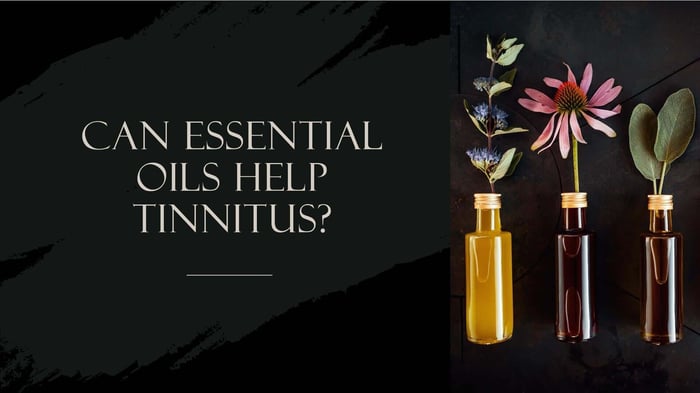Can Essential Oils Help Tinnitus? Yes, essential oils may help manage symptoms of tinnitus for some individuals, though it's important to note that effectiveness can vary and scientific evidence supporting their use specifically for tinnitus is limited.
While natural remedies like essential oils can be effective, it's crucial to consult with a healthcare professional before starting any new treatment, especially if your tinnitus symptoms persist or worsen.
What Are Essential Oils?
Essential oils are concentrated plant extracts that retain the natural smell and flavor, or "essence," of their source. They are often used in aromatherapy, a practice of using natural oils for psychological and physical well-being.
Understanding Tinnitus
Tinnitus, a condition where you hear noises like ringing in the ears when there's no external sound, can be managed with natural remedies, offering hope and relief to those affected.
Tinnitus Definition
Tinnitus manifests as ringing, buzzing, or other noises in your ears. It's a common condition, affecting many people worldwide. This condition is subjective tinnitus, meaning only you can hear these sounds. They aren't caused by an external source.
Common Causes
Several factors may lead to tinnitus. Loud noises are a primary culprit, especially for those frequently exposed to high decibel environments.
Ear infections also play a role, as they can cause temporary or permanent changes to ear function. Age-related hearing loss is another common cause, gradually affecting your ears' ability to process sounds correctly.
Impact on Life
Tinnitus can significantly impact your daily life. Its constant presence may cause distress and make it hard to concentrate.
Many people find it challenging to sleep due to the persistent noise. This can lead to fatigue during the day, affecting overall quality of life.

Best Essential Oils for Tinnitus
For tinnitus, certain essential oils are thought to have properties that might help alleviate symptoms such as stress, anxiety, and sleep disturbances, which can exacerbate or be affected by tinnitus.
Here are a few essential oils that some people find helpful:
1. Lavender Essential Oil
Known for its calming and relaxing properties, lavender oil can be beneficial in managing stress and anxiety associated with tinnitus.
2. Frankincense Essential Oil
This oil is often used for its potential to induce feelings of peace, relaxation, and satisfaction, which might help those dealing with the stress of tinnitus. It also has anti-inflammatory properties that can help reduce swelling in the inner ear, alleviating tinnitus symptoms.
3. Peppermint Essential Oil
Improves circulation and reduces congestion in the ears, providing relief from the buzzing and ringing sounds of tinnitus.
4. Juniper Berry Essential Oil
Some believe that juniper berry can detoxify and cleanse the body, potentially helping to improve circulation and reduce symptoms of tinnitus.
5. Tea Tree Oil
Anti-inflammatory and antimicrobial, tea tree oil helps clear blockages in the ears, a common cause of tinnitus.
6. Cypress Essential Oil
Cypress oil is thought to improve circulation and reduce feelings of anxiety, which could indirectly benefit individuals with tinnitus.
7. Clary Sage Essential Oil
Soothes the nervous system and reduces stress, offering a calming effect that may lessen the intensity of tinnitus.
8. Ginger Essential Oil
With its warming properties, ginger oil is sometimes used to improve blood circulation, which could theoretically benefit tinnitus symptoms.

How to Use Essential Oils for Tinnitus
It's crucial to use essential oils safely. They should be diluted with a carrier oil before topical application to avoid skin irritation, and they should not be ingested unless under the guidance of a healthcare professional.
Additionally, using a diffuser to inhale the aroma of essential oils can be a safer method of use for many people.
Before trying essential oils for tinnitus, it's advisable to consult with a healthcare provider, especially if you have underlying health conditions or are taking medication, as essential oils can interact with some medications.
Frequently Asked Questions
Can essential oils directly cure tinnitus?
No, essential oils cannot cure tinnitus. However, they can be used as part of a holistic approach to manage the symptoms.
Essential oils such as lavender and frankincense have properties that may help reduce stress and improve sleep, which can indirectly help individuals cope with the discomfort associated with tinnitus.
How do I use essential oils for tinnitus relief?
To use essential oils for tinnitus relief, you can apply them topically or use them through inhalation.
For topical application, dilute a few drops of the essential oil with a carrier oil like coconut or almond oil and massage gently behind the ears and on the neck.
Always perform a patch test before applying oils topically to ensure there's no allergic reaction.
For inhalation, add a few drops to a diffuser or inhale directly from the bottle.
Are there any specific essential oils recommended for tinnitus?
Lavender, frankincense, and helichrysum are commonly recommended for managing tinnitus symptoms. Lavender oil is known for its calming effects, which can be beneficial for stress-related tinnitus
Frankincense may support overall well-being and cognitive function, while helichrysum has been suggested for its potential nerve-regenerating properties.
What are the potential side effects of using essential oils for tinnitus?
While essential oils are natural, they can still cause side effects such as skin irritation, allergic reactions, and photosensitivity. It's crucial to dilute essential oils with a carrier oil before topical application to minimize skin irritation.
If you experience any adverse reactions, discontinue use immediately and consult a healthcare provider.
How long does it take to see results from using essential oils for tinnitus?
The effectiveness and time frame to see results from using essential oils for tinnitus can vary from person to person. Some individuals might notice improvements in their symptoms within a few days to weeks of consistent use, while others may not see significant changes.
Related Blog Post: Pulsatile Tinnitus
Share on Pinterest







